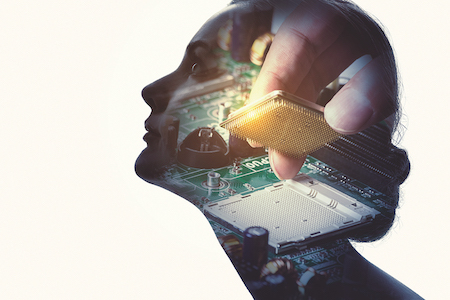The raging robot narrative
Robots can be scary in TV and the movies, from being chased by dog robots in Black Mirror, to Caleb in Ex Machina being psychologically tricked by humanoid Ava in a research facility.
Robots are often presented in popular discourse as seeking power and dictatorship over humans, creating anarchy, destroying the global population, or, at the lighter end (!) tricking us to believe they are human. In reality this is of course, not the case, yet many fear we’ll eventually end up in a real-life version of Westworld.
Of course there has also been much scaremongering over how robots will eventually become so advanced there will be no need for humans anymore. Yet are these worries accurate? I don’t think so. We are no way near having a robot as a colleague. Artificial intelligence (AI), however, which encompasses a wide range of computer systems and technology can process information in a way that previously, only humans could. And it is already something we’re using in everyday life – through our smartphones, to gaming and music streaming. This has already has been changing the way we’ve been working too – according to the CIPD in 2016 54% of the workforce in the UK work flexibly1, and this couldn’t be done without more advanced technology including AI.
When it comes to the legal profession, articles across the legal press have focused recently on the rise of AI and how law firms are using it to boost their output, improve efficiency and remain competitive. For example ROSS – a tool for lawyers which is powered by IBM’s Watson and helps find relevant cases by using natural language search or McCarthyFinch which has put together an AI platform which can create and approve contracts, and conduct document review processes, as well as a number of other tasks.
How Pinsent Masons has been utilising AI for the positive
Vario is an integral part of Pinsent Masons, who are leading the way when it comes to AI and law collaboration. AI is not out there to replace lawyers, it’s there to help lawyers do their job quickly and more efficiently – for example Pinsent Masons have developed technology which saves lawyers having to sift through documents and information, and allows more time for them to focus on the issues they need to rectify. In the last couple of years Pinsent Masons announced that it had built a program which guides lawyers through tasks by bringing in documents, templates and information on legal precedents, for instance allowing lawyers to assess legal risks against consistent, detailed criteria set centrally. The firm’s “TermFrame” system means its legal teams are able to delve deeper into the requirements of its clients and scale up its work to a level that would previously have been unfeasible.
Pinsent Masons has their own team of legal engineers and computer scientists to help their lawyers utilise the benefits of AI. The firm has already used AI in 7,000 matters, from property acquisitions, leases, licences and disposals; to complex due diligence and contract review to dispute resolution processes. AI has helped clients monitor progress of their cases, “creating more certainty of process and outcome for clients”.2
How humans and AI differentiate
Artificial intelligence will be able to help make lawyers’ lives easier and free up time for them to focus on more complex areas of legal work. The good news for many is that AI won’t be able to take over the role of a lawyer. AI systems don’t have soft skills like humans do – for example, emotional intelligence. Soft skills have traditionally been downplayed in the profession in favour of a logical, technical approach to law. However soft skills are necessary to form a relationship with clients. How many people would feel comfortable with a robot as their lawyer who doesn’t have human experience?
Clients want to trust their lawyers so they feel comfortable to raise confidential or personal concerns over legal issues, and feel as though they are understood. It’s important that lawyers strengthen their personable attributes as it can’t be underestimated how important it is for a client to feel that their lawyer understands their motivations and difficulties around a case.
Soft skills include the ability to manage and lead a team successfully, as well as have team working abilities. Lawyers should develop their resilience and their ability to think creatively about solving problems. Empathy is one of the key soft skills that should be prioritised. Despite the hype, robots are not sentient beings – even Robot Sophia, who although was granted citizenship by Saudi Arabia last year, is perhaps more of a marketing ploy after her Twitter account has been used to promote various products.
What does the future hold?
In the future we’re likely to see more law firms start to use AI to help bolster their output and improve efficiency. The more this technology is used, the more affordable it will be for smaller firms to take advantage of, yet it will take many years for this to filter into all law firms. It’s worth bearing in mind too that the more law firms and their clients buy into AI, the more they can offer initiatives such as flexible working to their lawyers. More lawyers will be able to work securely anywhere and everywhere. AI will continue to help lawyers do arduous tasks in a quick timeframe, meaning more time to manage a better work / life balance.
A recent study by Propero Partners – State of the Industry Report 2018 – found that although 73 per cent of law firms expect that all firms will benefit from integrating AI by 2025, only 37 per cent are planning to incorporate it into their business. It’s clear it will take a while for law firms to not just integrate AI into day-to-day work, but also be convinced of its benefits.
It’s about time the narrative is reframed to: robots will help rather than hinder lawyers.
- https://timewise.co.uk/wp-content/uploads/2017/06/Timewise-Flexible-Jobs-Index-2017.pdf
- https://www.innovative.legal/solutions/bringing-artificial-intelligence-to-life/

Matthew Kay, Director at Vario for Pinsent Masons.


.jpg)
.jpg)
.jpg)

.jpg)



.jpg)
